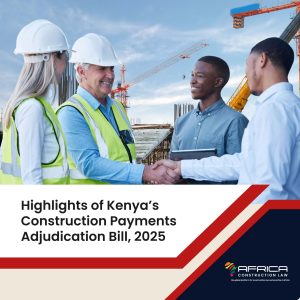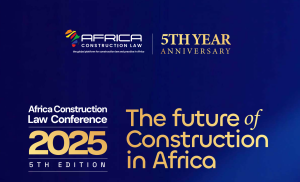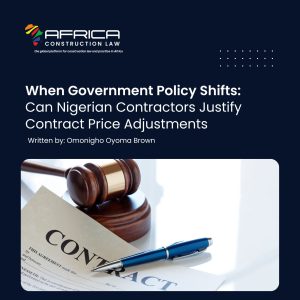Expanding the Toolbox: Expert Determination as a Mechanism for Resolving Construction Disputes in Africa
by Dr Bernd Ehle, Partner, LALIVE
Introduction
Construction disputes can take very different forms. Some are complex and involve multiple claims. Others revolve around a specific technical problem. Arbitration is undoubtedly the preferred method of resolving construction disputes in Africa. And rightly so, as arbitration is designed to resolve disputes in their entirety, including all factual, technical, economic, and legal issues (see Morris Muriu’s recent Case for arbitration as the appropriate mechanism for resolution of construction disputes on ACL). However, depending on the nature and complexity of the dispute, other mechanisms may be equally or even better suited to achieve effective dispute resolution. An often forgotten and underestimated tool is expert determination. It is designed to be used when a dispute is primarily about a specific technical or factual issue. Expert determination can be used instead of, or in conjunction with, arbitration proceedings to resolve the disputed issue through a specialized third-party neutral.
Expert determination clauses are rarely found in construction contracts for projects in Africa today. This article aims to raise awareness of this additional tool in the dispute resolution toolbox which, in the right circumstances, can prove to be the most efficient and cost-effective solution.
What is expert determination all about?
In expert determination proceedings, the parties instruct an independent expert to make a binding decision on a specific – narrow – issue in dispute. In the context of construction disputes, this can be a technical or factual issue that may arise in a project, such as the compliance of the construction with performance tests or the existence or causality of a defect. The expert, a specialised, neutral third party, makes a decision on the specific issue in dispute in a way that binds both the parties and the subsequent arbitral tribunal, if any. The expert is usually a professional from the industry or construction sector who has the necessary technical qualifications, knowledge, and experience to reach a fair and technically correct determination.
What is the content of an expert determination clause?
Expert determination is entirely consensual in nature and founded in contract. It is only very rarely regulated by statute, in Africa and elsewhere. The parties to a construction contract agree on expert determination in a specific clause or a separate agreement, either as a stand-alone dispute resolution mechanism or as part of the multi-tier steps the parties have to go through before arbitration. There is, of course, nothing to prevent the parties from agreeing on an ad hoc expert determination; however, experience has shown that this is difficult in the event of a dispute.
An expert determination clause should be carefully drafted to ensure a successful and smooth procedure. It typically specifies the potential technical issues that may arise and the required field of expertise of the expert. The clause also regulates the procedure for the (joint) selection, appointment and possible replacement of the expert, as well as the expert’s duty to act independently and impartially. It is advisable to clarify in the clause that the expert is acting as an expert and not as an arbitrator to avoid any confusion and unnecessary controversies between the parties about the expert’s powers and the nature of his or her decision. In addition, an expert determination clause usually specifies how the decision will be rendered (in writing, with or without reasons) and that the determination is final and binding, except in cases of fraud or manifest error. Finally, the clause or, better still, the terms of reference drawn up at the start of an expert determination procedure, should specify the expert’s mandate and competence as well as their limits and the details of the procedure, including the language of the proceedings and the place of meetings.
How are expert determination proceedings conducted?
The process of expert determination is generally more informal and less “legalistic” than arbitration. Thus, in an expert determination, unlike arbitrators, the expert is not strictly obliged to follow the rules of natural justice. The expert may conduct the proceedings as he or she sees fit, but of course always within the limits of the parties’ agreement and the expert’s terms of reference – and any subsequent agreement with the expert. It is up to the parties to decide to what extent they wish to delegate to the expert the power to lay down procedural rules. Certain aspects of the procedure can also be delegated to an (arbitral) institution. Institutions can also be instrumental in making proposals for the appointment of an expert and in monitoring deadlines and controlling costs.
The proceedings usually proceed in the following main steps: request for expert determination, answer to the request, appointment of the expert and drawing up of terms of reference and a procedural timetable, further submissions and/or a meeting or a site visit before the expert makes his or her determination or a proposal for an amicable settlement.
The time limits are generally fixed so that the proceedings can be completed within a few months. However, the timetable must allow sufficient time for the parties to fully present their views to the expert, and for the expert to properly consider the submissions and the evidence, to schedule and hold one or more meetings and to prepare the determination.
The parties’ submissions will usually be accompanied by documentary evidence only and no witness statements. The expert, who is vested with inquisitorial powers, may request additional information or documents at any time. However, the expert should refrain from holding separate meetings with the parties (caucusing) to avoid any appearance of bias or unfairness.
What are the advantages of expert determination?
Expert determination is by no means an equivalent to arbitration and is not suitable for every kind of dispute, especially fact-heavy and complex disputes (or breaches of contract or differences in interpretation where testimony is required). Moreover, there are limited grounds for challenging an expert’s determination and, importantly, expert determinations cannot be enforced like arbitral awards, which are subject to special worldwide enforcement rules under the 1958 New York Convention on the Recognition and Enforcement of Foreign Arbitral Awards.
In the right circumstances, however, expert determination offers the following advantages:
- quick resolution of disputed technical issues without lengthy proceedings and thus much more cost-effective;
- determination of key technical issues in dispute can pave the way for the parties to amicably resolve other outstanding issues as part of an overall settlement;
- great flexibility as the expert is not strictly obliged to follow the rules of natural justice and, if authorised to do so by the parties, can freely apply his or her own knowledge and experience, without having to account to the parties for the outcome of the investigations;
- if successful, significant cost savings due to the shorter duration of proceedings and streamlined proceedings, as extensive pleadings, document production, and witness statements are not required;
- potentially less confrontational than arbitration and suitable for parties who are culturally inclined to avoid heated disputes with their business partners and to maintain good relationships; and
- a confidential process (as opposed to court litigation) that allows parties to maintain the confidentiality of their contractual relationships and their disputes. Given the limited grounds on which an expert determination can be challenged, it is unlikely that the existence of an expert determination procedure and the resulting determination will become public knowledge.
Conclusion
Expert determination is gaining in popularity as a tool for resolving construction disputes and as part of a multi-tiered dispute resolution procedure. There is no reason why it cannot be successfully used for construction disputes in Africa. It is a particularly useful option where a dispute turns around one or two technical issues for which real expertise is required – especially when a quick and cost-effective determination of these issues can pave the way for a global settlement or disburden a subsequent arbitration. However, expert determination is not the appropriate dispute resolution mechanism if the dispute revolves around legal rather than technical issues or if it is too fact-heavy to be adequately resolved by expedited determination without witness testimony.
The successful and smooth conduct of an expert determination procedure depends to a large extent on the careful drafting of a bespoke clause and on the conduct and cooperation of the parties during the proceedings. Parties are also well advised to introduce arbitration as the final step of their agreed dispute resolution process, not only to have a mechanism to resolve a comprehensive and multi-layered dispute, but also to ‘enforce’ the expert’s decision if necessary.
For a more detailed treatise see the chapter “Expert Determination”, in: Andreas J. Roquette/Tom Christopher Pröstler (Eds.), International Construction Disputes – A Practitioner’s Guide, C.H.Beck/Hart/Nomos, 2022, pp. 66-80.


















